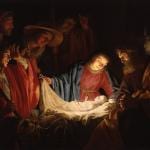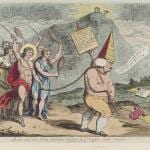At the Pope’s recent visit to Abu Dhabi, he and the Muslim Grand Imam of al-Azhar signed a document entitled “A Document on Human Fraternity for World Peace and Living Together.” Among other things, it said this:
The pluralism and the diversity of religions, colour, sex, race and language are willed by God in His wisdom, through which He created human beings. . .
This divine wisdom is the source from which the right to freedom of belief and the freedom to be different derives. Therefore, the fact that people are forced to adhere to a certain religion or culture must be rejected, as too the imposition of a cultural way of life that others do not accept.
All of the different religions are God’s will? There are no distinctions between religions that are true or false, orthodox or heretical, Biblical or idolatrous? The Triune God is fine with polytheism?
What about the First Commandment? What about Rome’s own claims to being the one true church? Does that just express superiority to Protestants, with just non-Christian religions considered equally valid?
And this Divinely-desired religious diversity is the basis for religious freedom? But if one religion is as Divinely-appointed as another, doesn’t that mean that there is no need for religious liberty, that a person might just as well accept the prevailing religion, since that is just as valid as one’s own preference?
Here is a Catholic theologian trying to spin the Pope’s pronouncement in a more positive light, as has become customary when the pontiff says something unorthodox, along with other things Rome has said about the validity of Islam:
This statement must be read in the proper context and perspective, said Dr Chad Pecknold, associate professor of systematic theology at The Catholic University of America in Washington, D.C.
“In sensitive inter-religious contexts, it is fitting for the Holy See to acknowledge that despite serious theological disagreements, Catholics and Muslims have much in common, such as a common belief that human beings are ‘willed by God in his wisdom,’” Pecknold told CNA.
“The idea that God wills the diversity of color, sex, race and language is easily understood, but some may find it puzzling to hear the Vicar of Christ talk about God willing the diversity of religions,” he noted.
“It is puzzling, and potentially problematic, but in the context of the document, the Holy Father is clearly referring not to the evil of many false religions, but positively refers to the diversity of religions only in the sense that they are evidence of our natural desire to know God.”
“God wills that all men come to know Him through the free choice of their will, and so it follows that a diversity of religions can be spoken about as permissively willed by God without denying the supernatural good of one true religion,” he added.
The Catechism of the Catholic Church speaks about the Church’s relationship with the Muslims: “The plan of salvation also includes those who acknowledge the Creator, in the first place amongst whom are the Muslims; these profess to hold the faith of Abraham, and together with us they adore the one, merciful God, mankind’s judge on the last day.”
But the thrust of the document is not that God “permits” false religions in the sense that we might say that His almighty providence “permits” bad things to happen. The document presents the multiplicity of religions as a good thing.
Illustration via MaxPixel, CC0, Public Domain












